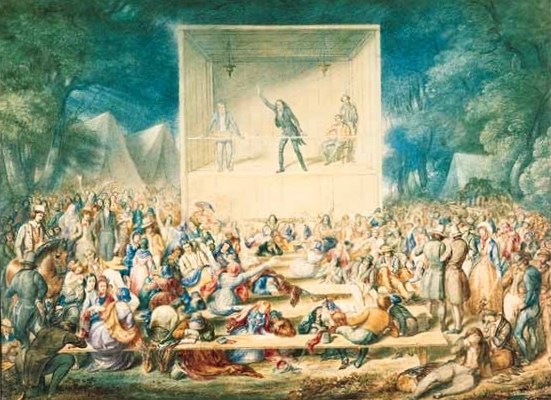The election of 1816 would be a lack luster one. Charles Pinckney and Richard Howell would maintain the Federalist Party nomination. What would make this election a lack luster one would be the candidates for the other parties. The Constitution Party was facing internal problems, largely over slavery. The northern Constitutionalists wanted to abolish slavery, while the southern Constitutionalists wanted to preserve the institution. In 1816 this would split the party in two, a Southern Constitution Party and a Northern Constitution Party.
The Northern Constitution Party would nominate Aaron Burr and Vermont congressman Joseph Smith [1]. The Southern Constitution Party would nominate Virginia Senator Andrew Moore, and Kentucky Governor Isaac Shelby. The Yeoman party would nominate North Carolina Senator James Turner, and Georgia Senator William Crawford. Pinckney would win the election, due in large part to the largely divided anti-federalists.
Pinckney’s second term would be very similar to his first. There was military buildup, tariffs, and industrialization. In 1816 white settlement was allowed to begin in the Indian territory because of an act passed by President Hamilton. South of the Indian territory, the Mississippi Territory would be admitted into the Union in 1817, and Illinois would be admitted to the Union in 1818, and Indiana is admitted to the Union in 1820.
In 1816 Henry Clay, Martin Van Buren, and John Randolph founded the American Colonization Society. The society was founded for two purposes; to settle free blacks in Africa, and to establish colonies on behalf of the United States. In 1820 the first colony created by the society was Liberia, located on the western coast of sub-Saharan Africa. It would start with a small settlement that would eventually become the capital, Pinckneyville, named for American President Charles Cotesworth Pinckney. At first the legal status of Liberia was in question. Was it an actual colony of the United States in the same way Canada was a colony of Great Britain, or was it territory governed by a company like the Rupert’s Land was to the Hudson Bay Company. It would not be until the 1850’s that Liberia and other settlements established by the American Colonization Society would be declared Colonies under the Authority of the Federal Government.
In 1820 Charles Cotesworth Pinckney would step down from the Presidency in order to allow the party their prize pick, the 43 year old Secretary of State Henry Clay. Clay’s accomplishments as Secretary of State included maintaining a strenuous peace with Spain, and cordial relations with France and Britain. Along with that were his accomplishments of establishing the American Colonization Society, although that would not become a government body until the 1870’s. In 1820 the Federalists nominate Henry Clay for the Presidency. The Party saw Clay at this point as finally being old enough and trained enough for the presidency, however he was still seen as being young by some, and so he was paired up with a party veteran Rufus King to be Vice President.
In 1820 a new party would materialize to challenge the Federalists. In March of 1820 leaders from the Northern Constitution, Southern Constitution, and Yeoman Parties met in Williamsburg, Virginia. They met to form a coalition of the anti-federalist parties. For 3 weeks they negotiated until they finally created a platform they could all live with. They would form the Patriots for Liberty Party, which would eventually just be referred to as the Patriot Party. The platform of the Party included Pro-States Rights, Anti-Central Banking, Anti-Expansionism, Pro-Free Trade, and Anti-Agressivist Wars. This stood in contrast to the Federalist positions of Federal Supremacy, Pro-Banking, Pro-Expansion, and Protectionism. The party would nominate a dark horse candidate, Theophilus Foulke III, a member of the Pennsylvania legislature for the Presidency. For the Vice Presidency they would nominate Martin van Buren.
The election would be close, but the Federalists would come out ahead. They would gain the presidency and would have slim majorities in congress.

